Amid the swirling sands and blistering heat native to arid regions, protecting vehicles from environmental extremes demands advanced engineering and a deep understanding of local conditions. Wind-resistant parking shades are not just a visual upgrade—they are a vital, meticulously engineered defense against destruction during windstorms and sand-laden gusts. As cities like Dubai, Riyadh, and Abu Dhabi expand into harsher climates, the necessity for reliable, windproof car parking shades in commercial spaces becomes a matter of safety, compliance, and long-term asset protection.
At first glance, car parking shades, including wind-resistant parking shades, may seem straightforward: a canopy, a frame, and a basic installation. However, the real science lies in the sophisticated design process, driven by wind load calculations, robust anchoring systems, and strict adherence to regional building codes. End-users see sleek automotive protection, but beneath the surface are critical structural decisions made by architects and engineers who specialize in these outdoor shelters.
Facing Desert Storms: What Makes Parking Shades Wind-Resistant?
Conventional car shade structures often fail under strong wind conditions because they lack the reinforcements required by desert environments. High-velocity winds bring not only intense force but also abrasive sand and debris, leading to structural failure, costly repairs, and potential danger. In contrast, wind-resistant parking shades—like those engineered and installed by Al Madina Parking Shade—are explicitly designed with advanced features to withstand the harshest conditions.
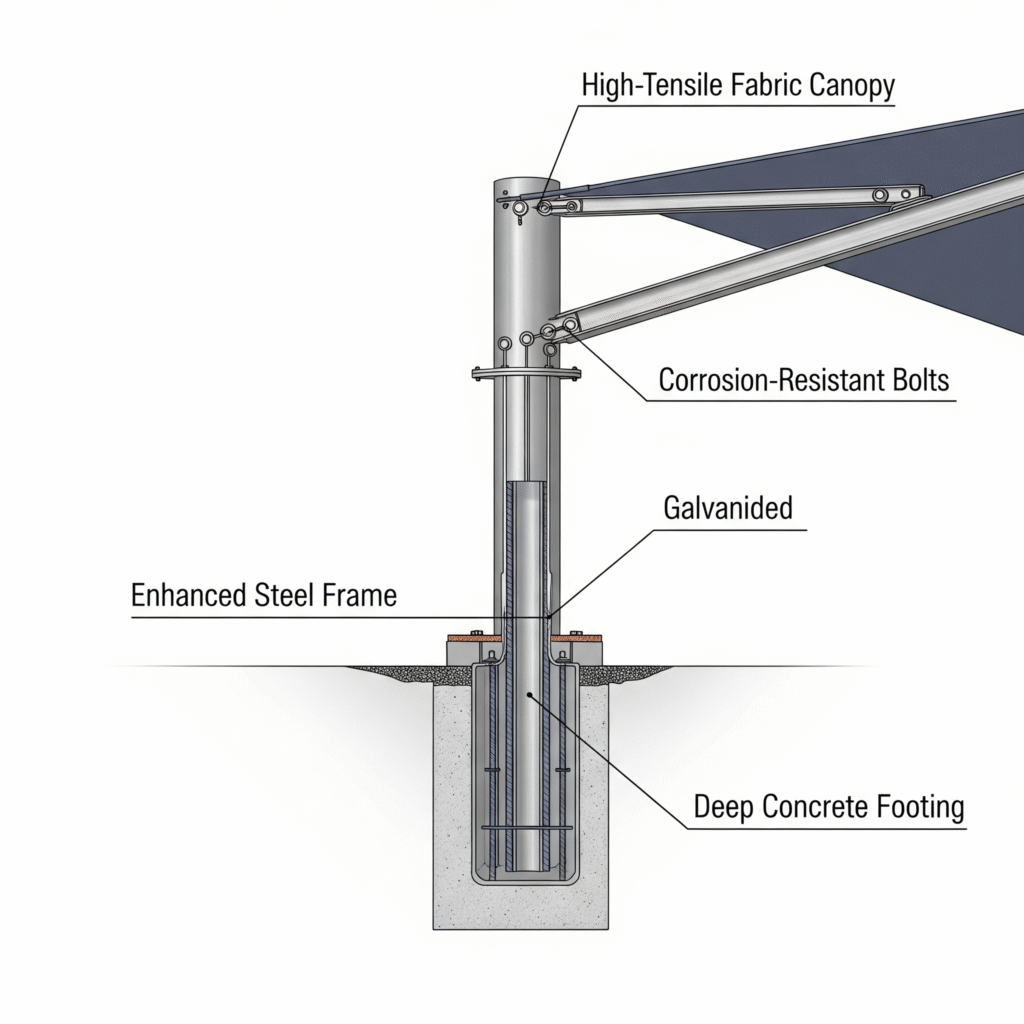
Key Features of Wind-Resistant Parking Shades
- Wind load analytical modeling: Advanced computational analysis ensures every structure is tailored to local wind patterns.
- Enhanced steel or aluminum structural components: High-grade, galvanized steel or premium aluminum alloys provide superior strength and corrosion resistance.
- Deep concrete footings for anchoring: Foundations are engineered to resist uplift and lateral forces, even in sandy or unstable soils.
- High-tensile, breathable ripstop shade fabric: UV-stabilized, tearproof materials, ideal for car parking shades, ensure longevity and performance.
- Corrosion-resistant hardware: Stainless steel bolts, brackets, and fittings prevent rust and extend service life.
Below is a comparison of standard shades versus wind-resistant parking shades:
| Attribute | Standard Parking Shade | Wind-Resistant Parking Shade |
|---|---|---|
| Max Wind Speed | 40-60 km/h | 120+ km/h |
| Frame Material | Mild Steel or Aluminum | Galvanized Steel/High-Grade Alloy |
| Anchoring | Surface-mounted | Embedded Deep Foundations |
| Fabric Strength | Regular Polyethylene | UV-Stabilized, Tearproof PVC |
| Compliance | Basic local codes | Regional wind load regulations |
The difference is clear: wind-resistant parking shades, such as those offered by Al Madina Parking Shade, stand firm when sandstorms strike—a necessity for installations across the Middle East, Southwest US, Australia, and Africa.
Decoding Wind Load Calculations
Car parking shades face wind forces at magnitudes far greater than typical architectural structures. The frames and tensile members must resist uplift and lateral loads generated by storm-driven gusts. Engineers calculate wind load using the following equation:
Wind Load (Force) = .5 x Air Density x (Wind Speed)^2 x Area x Drag Coefficient
Variables such as topography, elevation, exposure category, and site-specific climate data are factored into the calculations. For example, projects in Dubai or Riyadh may use wind speeds of 120-150 km/h as a baseline, reflecting the frequency and intensity of sandstorms.
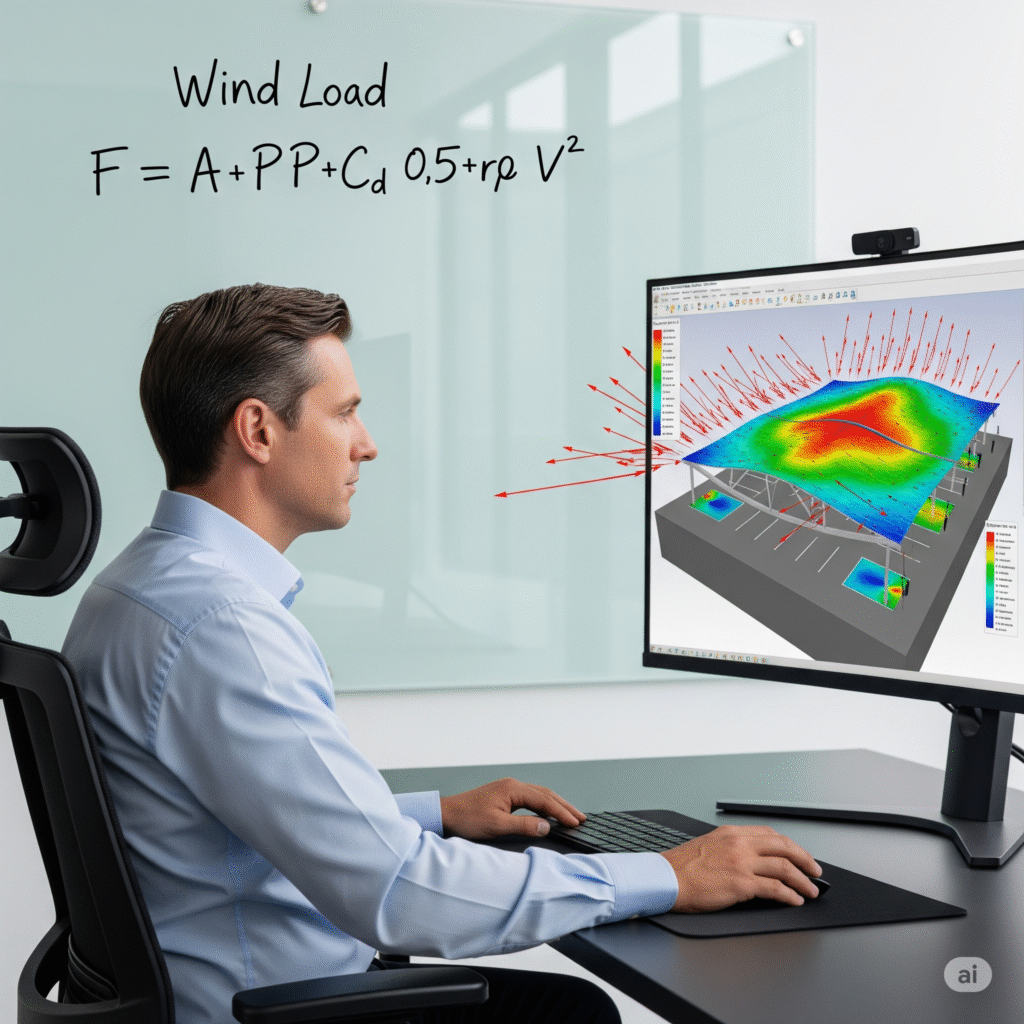
Fabric canopies, especially those used in wind-resistant parking shades, require tensioning systems that distribute force throughout the structure and facilitate rapid water drainage to prevent pooling—a crucial detail when rare rainfall hits parched desert grounds.
Key Steps in Wind Load Analysis
- Site-Specific Assessment: Review historical wind data, average speeds, and gust frequencies.
- Surface Area Estimation: Calculate the total exposed canopy and frame area.
- Material Testing: Establish tensile strength of fabrics and yield strength for metal poles.
- Dynamic Simulation: Model structures in software against sustained and peak wind events.
- Factor of Safety: Integrate overbuild margins to prevent failure in extraordinary circumstances.
Structural software such as SAP200 and AutoCAD Civil is often utilized for digital modeling, enabling scenario-based design and accurate wind resistance validation.
Steel Frames, Anchoring, and Fabric: The Trio of Reliability
While calculations are vital, material choice and deployment method determine real-world resilience. High-grade, galvanized steel frames outperform lighter metals by resisting rust and withstanding the impacts from flying debris during severe storms, making them exceptionally durable. The geometry of the posts and trusses matters as well; streamlined columns reduce wind turbulence, while triangular or arch-shaped profiles dissipate pressure more consistently in wind-resistant parking shades.
Anchoring Techniques
Anchoring is what truly sets windproof parking shades apart. Instead of shallow surface fixing, engineers specify reinforced concrete foundations well below the frost line (if applicable), or deep pile anchors in sandy terrain. These may include:
- Heavy-duty anchor bolts set into reinforced concrete pads
- Screw-in helical piers for rapid deployment in loose or granular soils
- Load-distribution plates for wide-span structures
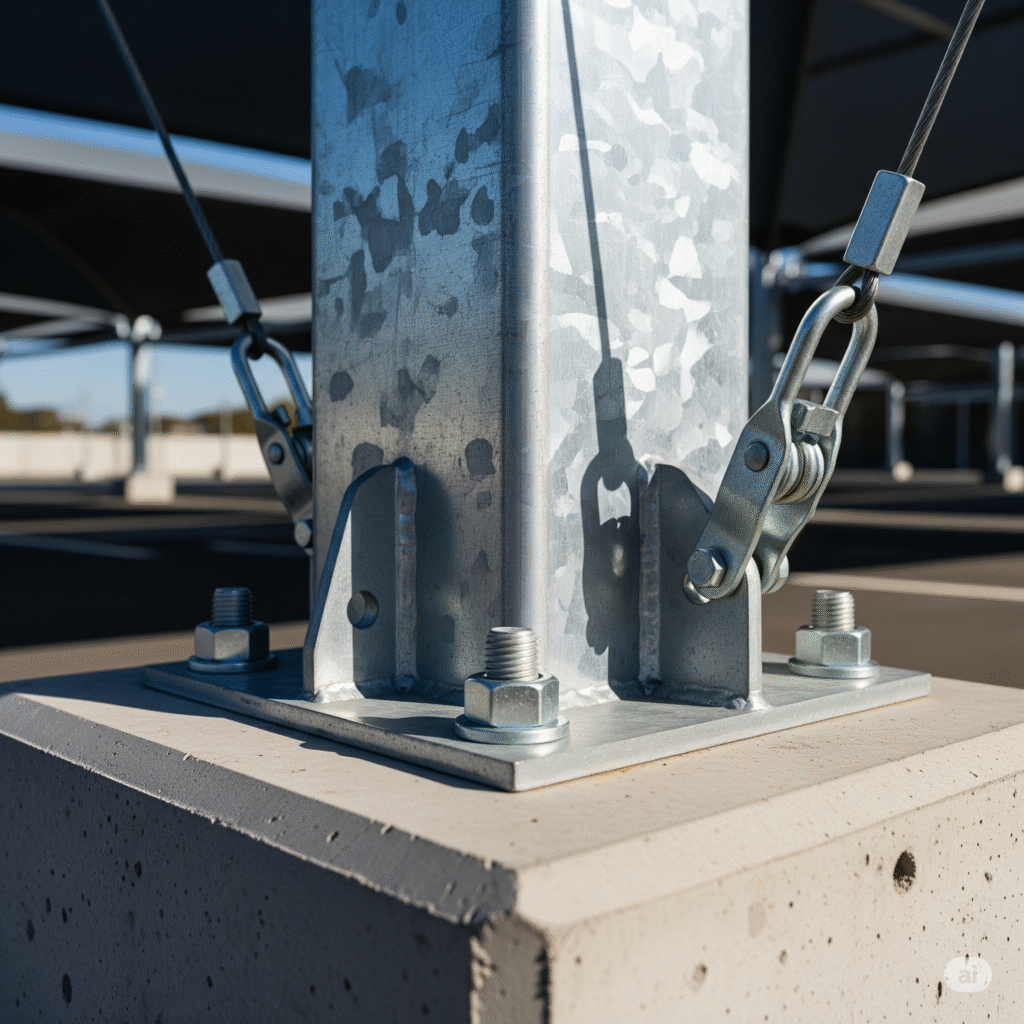
Each fixation is calculated to accommodate not only static loads, such as the combined weight of the structure and canopy, but also dynamic forces that may fluctuate within seconds during gusty squalls, ensuring they are suitable for wind-resistant parking shades.
Superior Shade Fabrics
UV-stabilized high-density polyethylene, PVC-coated polyester, and PTFE-coated glass fiber are among the most popular choices. These breathable fabrics are engineered to resist tears, shed rain quickly, and minimize wind drag. Successful projects match the fabric’s tensile properties to the calculated wind loads for complete reliability.
Al Madina Parking Shade sources only the highest quality materials, ensuring that every installation, including wind-resistant parking shades, meets or exceeds regional standards for wind resistance and durable performance.
National and Regional Regulations Shape Every Detail
Installing windproof car parking shades, including wind-resistant parking shades, is not just about selecting premium parts. Local authorities and international codes set stringent standards for wind resistance, load calculations, and fire safety. Manufacturers and contractors must follow these codes to guarantee legal operation and ensure insurance eligibility. Influential guidelines include:
- ASCE 7 (American Society of Civil Engineers) standards for minimum wind load requirements
- Dubai Municipality and Saudi Building Code mandates for steel and tensile membrane structures
- British Standard BS EN 1991 for Actions on Structures (European Norm)
- Local zoning ordinances regarding setback, height limits, and visibility
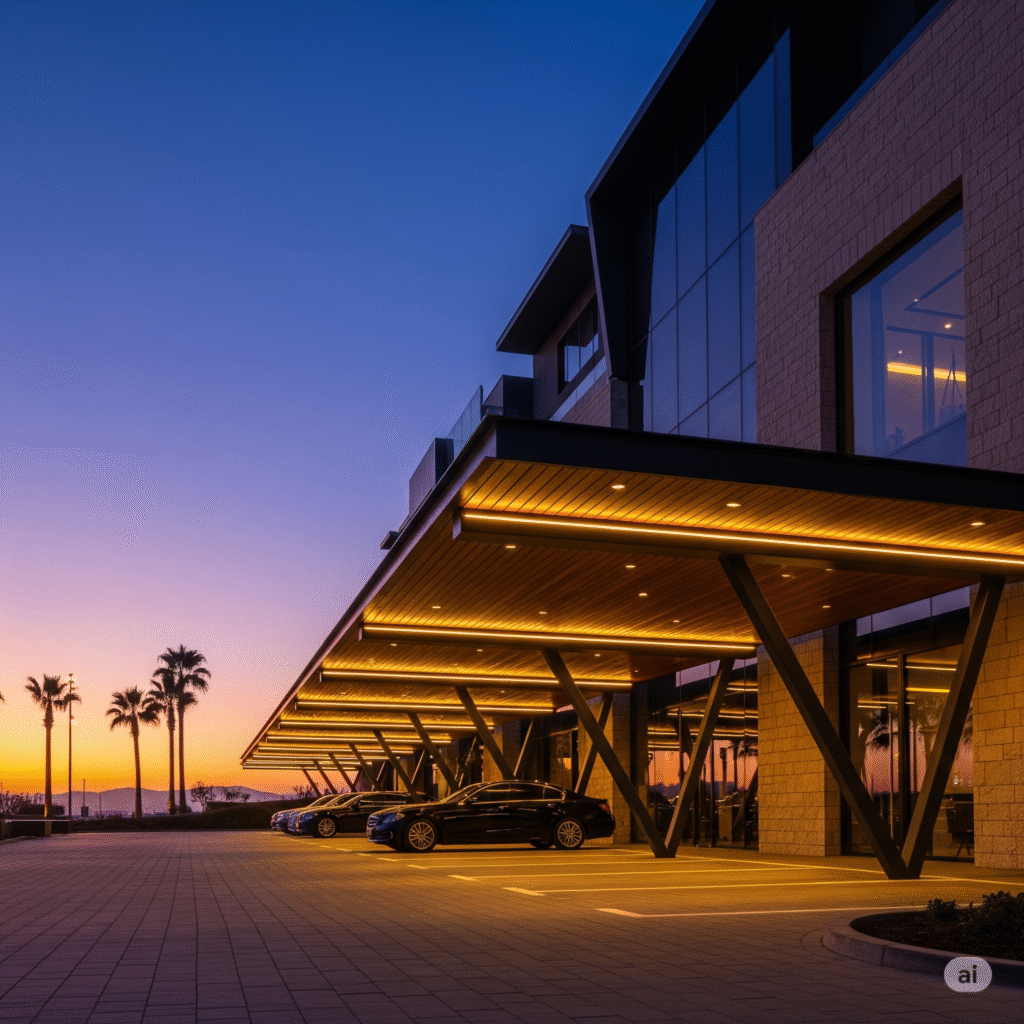
Inspection and certification occur both pre- and post-construction for many urban parking shade projects. Compliance is audited by licensed structural engineers to confirm all calculations, welds, concrete pours, and fabric tensioning have been executed to specification.
Typical Regulatory Checklist
- Wind load calculation report
- Material certificates (steel grade, fabric UV resistance)
- Engineering drawings stamped by a registered engineer
- Anchoring and footing inspection logs
- Final as-built sketches for municipality archives
Falling short of these requirements can cause costly interruptions or even necessitate dismantling of a non-compliant structure.
Integrating Aesthetics With Performance
Being storm-hardy does not mean wind-resistant parking shades are utilitarian eyesores. Architects work closely with fabricators to integrate the structural necessities of wind load resistance into beautiful, contemporary designs. Varying form factors such as cantilever, pyramid, and tensile structures are possible with correct engineering and fabric selection.
Color choice, custom valances, and even printed logos are all available for car parking shades without affecting strength, provided the technical parameters remain uncompromised. Large commercial complexes, hotels, and retail outlets often select outdoor shelters and wind-resistant parking shades for their commercial spaces that reinforce their branding while adhering to all applicable safety and climatic requirements.
Modern manufacturing enables design flexibility so even high-capacity parking lots can utilize a unified, corporate theme without compromising resilience.
Maintenance Considerations For Long-Term Durability
While engineering and installation get the spotlight, ongoing care extends the working life of car parking shades and wind-resistant structures. Sandstorms deposit fine grit in joints and tensioning systems. Regular maintenance programs typically involve:
- Cleaning debris from canopies after major wind events
- Tightening and inspection of bolts, cables, and anchoring hardware
- Checking for corrosion or UV-induced degradation of components
- Reapplying protective coatings as necessary
Professional maintenance services, such as those offered by Al Madina Parking Shade, provide detailed logs and annual certification renewals to assure both asset owners and municipal inspectors that shades remain at required standards.
Adaptive and Sustainable Engineering
With the increasing frequency of severe weather events, even regions previously unaffected by strong winds are seeing a surge in demand for wind-resistant car parking shades. This has driven research into recycled steel, low-VOC coated fabrics, and energy-efficient manufacturing processes. Some new projects integrate solar panels atop the tensile canopies, merging renewable energy generation with traditional weather protection.
Here’s how different aspects contribute to sustainability and adaptive engineering:
| Feature | Contribution |
|---|---|
| Recycled or reclaimed steel | Reduces environmental impact and energy consumption |
| Solar-enabled canopies | Provides clean energy, powers lighting or nearby devices |
| Smart sensors | Alert for high winds automatically, retracting shades if needed |
| Modular design | Allows reuse or adaptive modification post-installation |
Municipalities are increasingly requiring new shade structures to document their carbon footprint, making environmentally conscious choices a core part of the design and approval cycle.
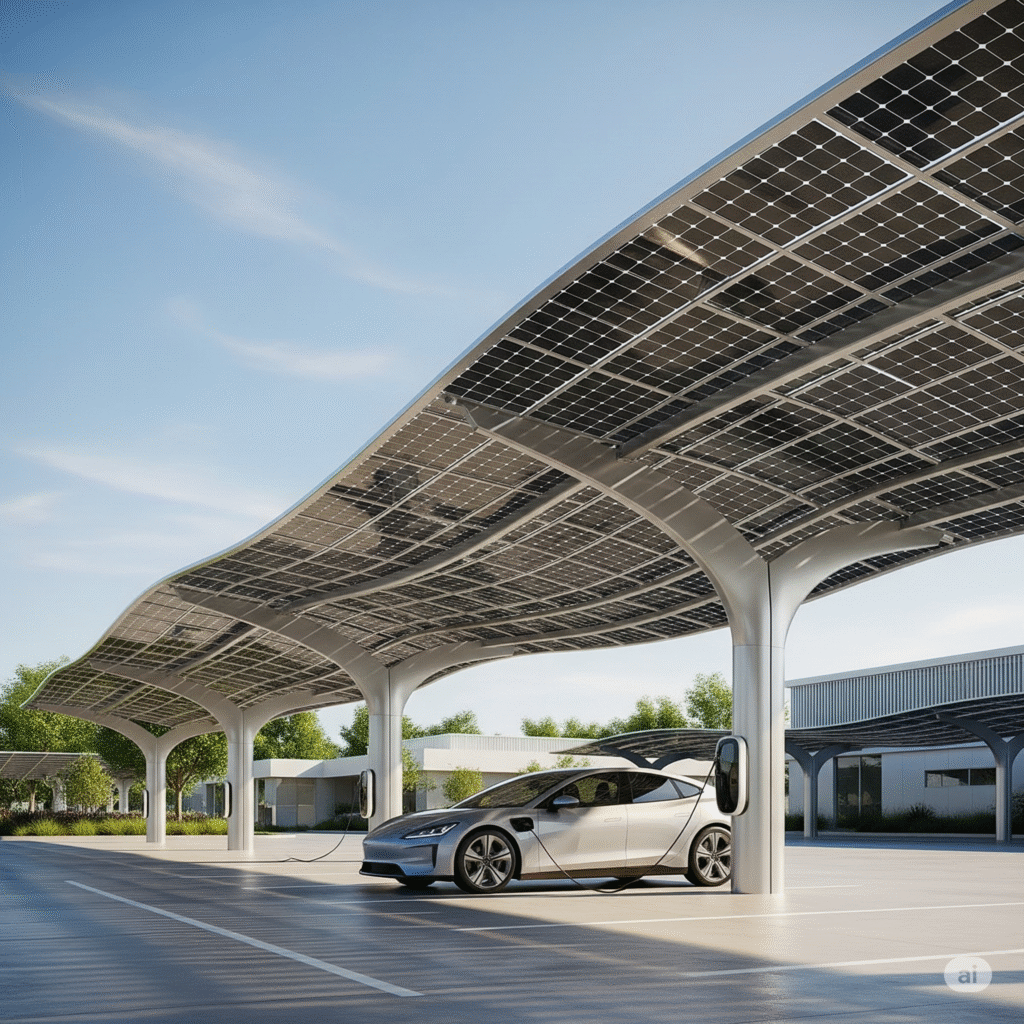
Why Choose Al Madina Parking Shade for Wind-Resistant Parking Shades?
When it comes to wind-resistant parking shades, expertise, experience, and a commitment to quality are non-negotiable. Al Madina Parking Shade stands out as a leader in the field, offering comprehensive solutions tailored to the unique demands of desert and coastal environments. Here’s why our services are the preferred choice for discerning clients:
Comprehensive Engineering and Design
Our team of structural engineers and architects uses the latest wind load calculation software and simulation tools to design wind-resistant parking shades that meet or exceed all relevant codes and standards. We conduct thorough site assessments, factoring in local wind patterns, soil conditions, and exposure categories to ensure every installation is optimized for safety and durable performance.
Premium Materials and Construction
We source only the highest quality breathable, UV-stabilized fabrics, galvanized steel, and aluminum alloys. Our anchoring systems are engineered for maximum holding power, whether installed in sandy deserts or urban environments, and our wind-resistant parking shades provide additional protection against harsh weather conditions. Every weld, bolt, and fabric panel is inspected and certified to guarantee long-term performance.
Regulatory Compliance and Certification
Navigating the complex landscape of building codes and municipal regulations can be daunting. Al Madina Parking Shade manages the entire compliance process, from wind load reports and material certifications to engineering drawings and final inspections. Our clients enjoy peace of mind knowing their investment is fully protected and legally compliant.
Customization and Aesthetics
We believe that functionality should never come at the expense of aesthetics. Our design team works closely with clients to create parking shade solutions, including wind-resistant parking shades and car parking shades, that complement existing architecture and reinforce brand identity. Choose from a wide range of colors, shapes, and finishes to achieve the perfect balance of style and performance.
Maintenance and After-Sales Support
Our commitment doesn’t end with installation. We offer comprehensive maintenance packages for car parking shades, including regular inspections, cleaning, tension adjustments, and certification renewals. Our responsive support team is always available to address any issues and ensure your shades continue to perform at their best.
Sustainable Solutions
Al Madina Parking Shade is dedicated to sustainable engineering. We offer options for recycled materials, low-emission coatings, and solar-integrated canopies. Our modular designs allow for future expansion or adaptation, ensuring your investment remains relevant as needs evolve.
Applications of Wind-Resistant Parking Shades
Wind-resistant parking shades are essential for a wide range of applications, including commercial spaces:
- Commercial parking lots: Protect employee and customer vehicles from extreme weather.
- Residential complexes: Enhance property value and provide peace of mind for residents.
- Hotels and resorts: Offer guests premium protection and reinforce brand image.
- Hospitals and healthcare facilities: Ensure uninterrupted access and safety for patients and staff.
- Educational institutions: Safeguard student and faculty vehicles while maintaining campus aesthetics.
- Government and municipal buildings: Meet stringent safety standards and demonstrate civic responsibility.
- Industrial facilities: Protect valuable assets and maintain operational continuity during storms.
No matter the application, Al Madina Parking Shade delivers solutions that combine technical excellence with visual appeal.
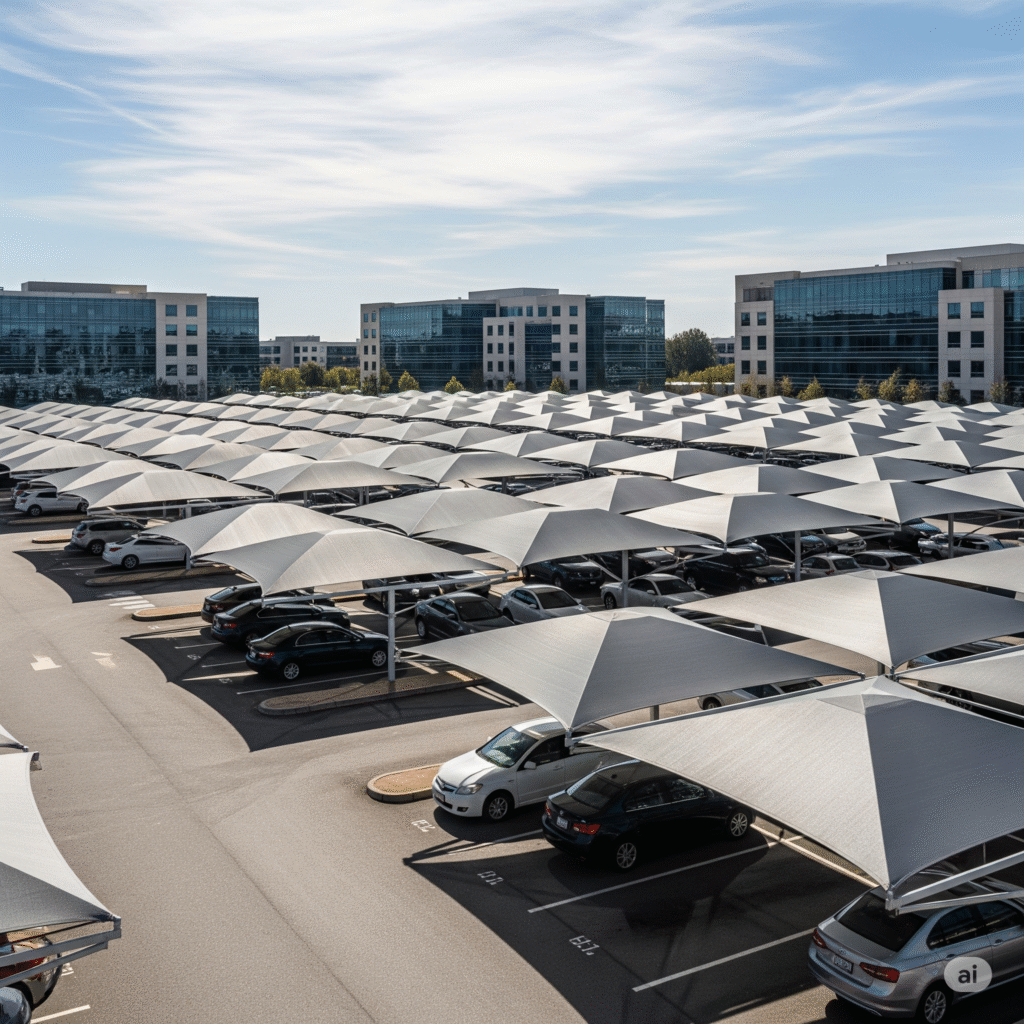
The Future of Car Shade Engineering
With city planners and real estate developers aiming for future-proofed infrastructure, expect even more sophisticated wind load simulation, stronger materials, and integrated technologies. Artificial intelligence-driven design optimization is already trimming costs and materials without sacrificing safety.
Users get not just car parking shades to keep their cars cool and out of the sun, but a line of defense against desert storms, flying debris, and even the unexpected effects of climate change.
Listening to the land and engineering for its wildest moods remains a hallmark of world-class shade design. Wind-resistant parking shades, when done right, combine sophisticated calculation, meticulous installation, and a dash of creative flair, resulting in outdoor solutions ready for whatever nature throws their way.
Ready to Upgrade? Contact Al Madina Parking Shade
If you’re seeking wind-resistant parking shades engineered for desert storms, trust the experts at Al Madina Parking Shade. Our team is ready to guide you through every step—from initial consultation and design to installation and ongoing maintenance. Protect your vehicles, enhance your property, and ensure compliance with the region’s toughest standards.
Contact us today to schedule a free site assessment and discover how our wind-resistant parking shades can transform your outdoor spaces into safe, stylish, and sustainable environments.
External Valuable Resources
- American Society of Civil Engineers (ASCE) – Wind Load Standards
- Dubai Municipality – Building Codes and Regulations
- International Building Code (IBC) – Wind Load Provisions
- National Fire Protection Association (NFPA) – Fire Safety for Structures
- U.S. Department of Energy – Cool Roofs and Shade Structures
- British Standards Institution (BSI) – BS EN 1991 Actions on Structures
- Fabric Architecture Magazine – Tensile Structure Innovations
- World Meteorological Organization – Sand and Dust Storms
- Solar Energy Industries Association – Solar Canopy Benefits
- U.S. Green Building Council – Sustainable Building Practices

